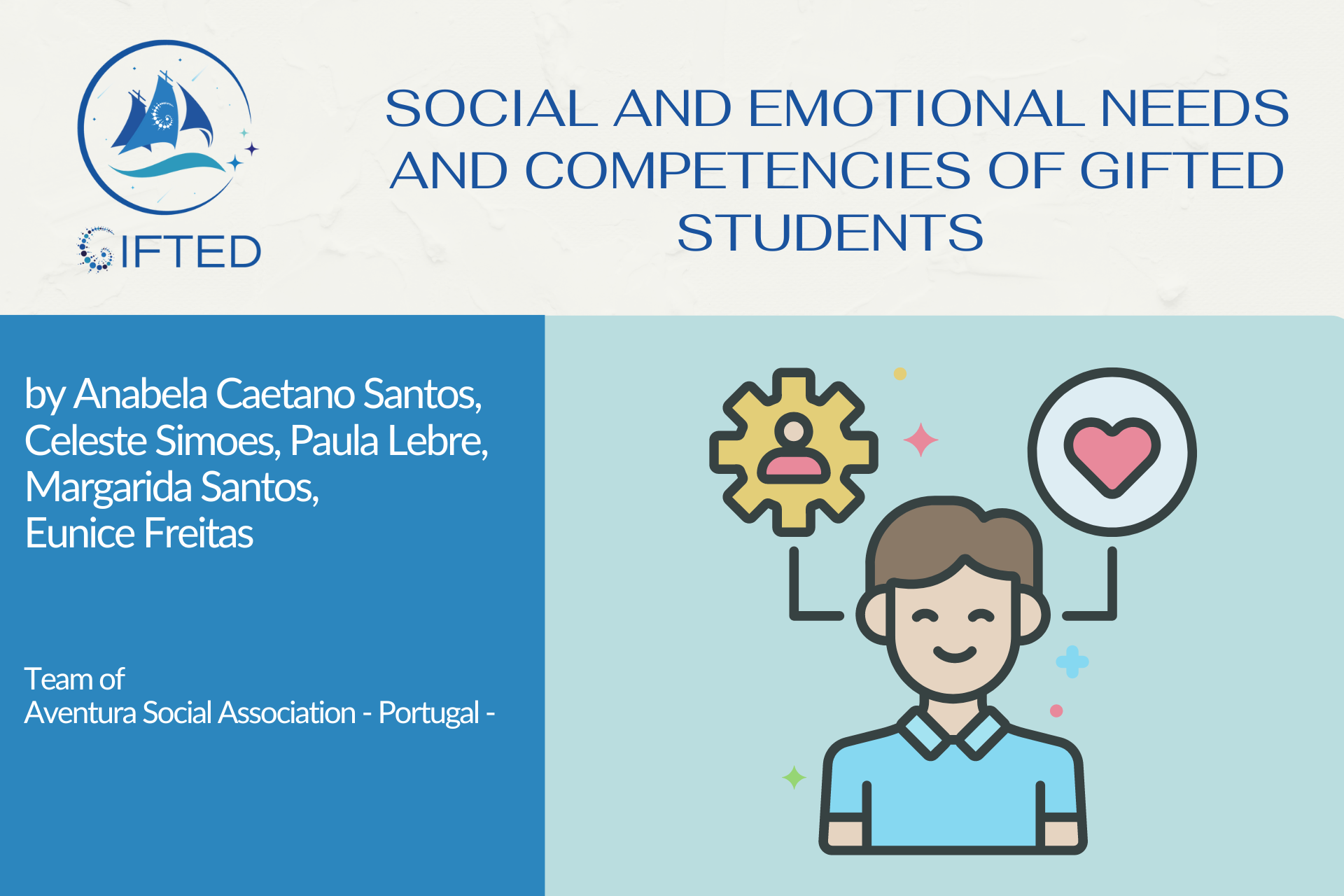Latest news

Social and Emotional Needs and Competencies of Gifted Students
by Anabela Caetano Santos, Celeste Simões, Paula Lebre, Margarida Santos e Eunice Freitas
Social and emotional competencies (SECs) include, but are not necessarily limited to, effectively recognising and regulating our emotions, solving problems, making ethical and responsible decisions, setting and attaining goals, and establishing caring and positive relationships with others while avoiding maladaptive behaviours (Weissberg et al., 2015).
The concept of social and emotional needs in gifted and talented children is highly associated with asynchronous development, meaning a discrepancy between gifted individuals’ cognitive, social, emotional, and physical development. An example could be a gifted child that can be academically developed, operating in the 9th grade but being ten years old and having to deal with the frustration of their physical development being underdeveloped, for instance, having difficulties riding a bike. Another possibility could be an adolescent with high body-kinesthetic intelligence (higly talented in sports) that has difficulties in reading. Despite asynchronous development being prevalent in gifted individuals, the simplistic idea of highly cognitively developed students manifesting great difficulties in terms of social, emotional and physical areas of their development might not be accurate. Research has shown contradictory findings, showing that gifted students’ development is neither simplistic nor homogeneous (Rinn & Majority, 2018).
The social and emotional development of gifted children and adolescents is a field of research where great inconsistencies are found, as stated in previous systematic reviews about the association between social, emotional and behavioural disorders and giftedness found great heterogeneity between findings (Francis et al., 2015; Tasca et al., 2022). And according to Francis et al. (2015) gifted children demonstrate superior socio-emotional adjustment and fewer behavioural difficulties than their typically developing peers. Specifically, gifted children appear to be less prone to anxiety with fewer or equal behavioural difficulties.
However, despite the most recent research pointing out that a considerable percentage of gifted students have a level of social and emotional skills appropriate for their age level and do not manifest behaviour problems or relevant social adjustment, a part of these students may have great difficulties in these domains, requiring the attention and awareness of teachers in this regard. A variable associated with more social and emotional difficulties has been the IQ level, with highly intelligent gifted students expressing more difficulties than mildly gifted students. Other relevant variables that can increase the possibility of gifted and talented children expressing social and emotional difficulties are:
· the presence of learning difficulties (do not forget that the talent/gift can be in a particular topic) or other comorbidities (i.e., the most frequent being attention-deficit/hyperactivity disorder (ADHD), autism spectrum disorder (ASD))
· being underachievers,
· belonging to a minority group or socio-economic disadvantaged family.
The relevance of Social and emotional learning (SEL) to gifted and talented students is no different from the purpose of SEL for those not gifted. Though, as Freeman (2018) suggests, gifted and talented children might face specific challenges, such as:
i) the expectation to excel in all domains, even though they might be gifted or talented in only one area can increase perfectionism
ii) the expectation (from others) of being natural leaders,
iii) boredom, disengagement and underachievement as a result of working continuously at either a very demanding level or not challenging enough, or
iv) difficulties in finding peers with the same interests.
For instance, in a qualitative study with seven participants in grades 6 to 8, students reported feeling that parents and teachers did not know about their social and emotional difficulties, that parents had perfectionist expectations about their results, and were afraid of social exclusion by peers (Yilmaz, 2015). Also, social or emotional difficulties might increase with the level of giftedness, with increased difficulties in finding interested peers or adequate fit at school or in the community (Peterson, 2009).
References
Francis, R., Hawes, D. J., & Abbott, M. (2015). Intellectual Giftedness and Psychopathology in Children and Adolescents. Exceptional Children, 82(3), 279–302. https://doi.org/10.1177/0014402915598779
Freeman, J. (2018). The Emotional Development of the Gifted and Talented. In The SAGE Handbook of Gifted and Talented Education (pp. 169–183). SAGE Publications Ltd. https://doi.org/10.4135/9781526463074.n16
Peterson, J. S. (2009). Myth 17: Gifted and talented individuals do not have unique social and emotional needs. Gifted Child Quarterly, 53(4), 280–282. https://doi.org/10.1177/0016986209346946
Tasca, I., Guidi, M., Turriziani, P., Mento, G., & Tarantino, V. (2022). Behavioral and Socio-Emotional Disorders in Intellectual Giftedness: A Systematic Review. Child Psychiatry and Human Development. https://doi.org/10.1007/s10578-022-01420-w
Weissberg, R. P., Durlak, J. A., Domitrovich, C. E., & Gullotta, T. P. (2015). Social and emotional learning: Past, present, and future. In J. A. Durlak, C. E. Domitrovich, R. P. Weissberg, & T. P. Gullotta (Eds.), Handbook of Social and Emotional Learning: Research and Practice (pp. 3–19). The Guilford Press.
Yilmaz, D. (2015). A qualitative study to understand the social and emotional needs of the gifted adolescents, who attend the science and arts centers in Turkey. Educational Research and Reviews, 10(8), 1109–1120. https://doi.org/https://doi.org/10.5897/ERR2015.2134
